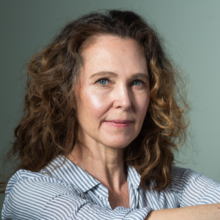Most of us grow up thinking the body is a flesh and blood organism made up of parts and systems. It is something that is described and researched, an object to be known. Rarely do we think of the body as something that knows things. Rarely do we ask the body for answers.
For answers, we turn to the mind. But in doing so, we cut off an enormous dimension of our moment by moment experience. The mind knows things, but it does not know everything.
What does our body know that the mind does not? We can only discover what the body knows by an act of receptivity: we can listen. We are pretty good at listening to the mind’s knowledge, our thoughts, ideas and opinions. But many of us have not listened much to the body.
To listen deeply to the body is not a practice of thinking… it is a practice of paying close attention. Listening to the body involves dropping our attention — even pouring our attention — down from the push and pull of the thinking mind into the field of feeling and perception that is happening right now. This is a profound redirection of attention.
When you listen to your body in this way, you discover gems of wisdom held by your body. These knowings can actually teach your mind things it does not yet know or believe. Let me repeat that, because it’s kind of a radical idea: your body can teach your mind. This is something that the mind might resist, because not only does it want to know everything… it wants to manage and control everything. It wants separation from the body. That is one of the most challenging things about being human.
To listen to the body, the mind must surrender some of its control, and possibly even consider that it is not as separate from the body as it has believed.
What does the body teach the mind? This is a short reflection, so I may not get to all the things this body can teach your cognitive mind about “you”, meaning your entire embodied self. But I can offer here four things the body teaches:
1. You are grounded. This is not an abstraction. You can feel the force of gravity right now, at this very moment, at the base of your body. If you bring your attention to the place where your body comes into contact with a horizontal surface — your feet on the floor, your thighs on the chair, or your bottom against a cushion — you will notice a feeling of groundedness, a stability. This groundedness can become an “aha” moment for the mind. Suddenly you are no longer spinning around in your thoughts, but you are stable and earth-bound. What a relief!
2. You are present. When you come down into your body, you notice that feeling and sensation exist. You are breathing. You are sensing the air on your skin. You are seeing and smelling. All these sensations are happening in the present moment through the medium of your body. This body is not sensing all this in the past. It is not sensing it in the future. Your body lives in the here and now. When the mind comes along for this ride, it discovers this truth: I can live in the here and now. If I do that, I will not miss my life.
3. You are intuitive. The body is like a radar that receives signals and encodes them. While the mind often lies to us, the body usually tells the truth. You are intuitive in the sense that your body knows how you truly feel about things, even when your mind is telling you a totally different story. The body is also intuitive about others, and can help us access deeper resources of empathy and compassion.
4. You are non-conceptual. We tend to believe that the most “real” part of the self is the thinker, the part of the self that is conceptual. We do not often notice that much of our experience is taking place in another realm: the realm where thoughts do not have the final say. The body lives in this realm. The body is not ruminating about the past. It is not worrying about the future. It is just feeling. It is open and expansive to its world. When you notice there is already a dimension of your life that is non-conceptual and therefore spacious, that can teach your mind how to let go of its own self-imposed boundaries.
The body’s knowledge is there for the taking. Every one of us has one. When we start to listen, the body becomes the dharma door.

